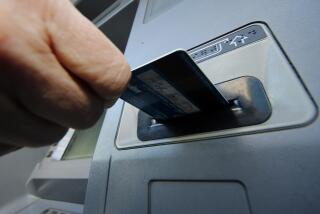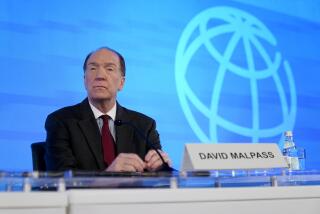World Bank Catching On to Democracy, Human Rights : Lending: How a state treats its citizens is becoming important to an institution formerly focused solely on economics.
- Share via
A revolutionary shift is occurring in the world’s most influential multilateral banking institution.
Since it was chartered in 1945, the World Bank has firmly resisted what it views to be political considerations in evaluating loan applications and project lending. But recently, in two significant cases, the World Bank has broadened its lending calculus to incorporate such issues as government accountability, pluralism and the rule of law under the broader rubric of what it calls “good governance.” Bank officials, dissatisfied with the performance of President-for-Life H. Kamuzu Banda of Malawi and Kenya’s autocratic President Daniel Arap Moi on these issues, have asked these countries for verifiable improvements in human rights and the democratic process.
Such action would have been unthinkable only a few years ago. The bank has long insisted that loan decisions be based exclusively on economic performance; “non-economic” considerations were shunned as potentially in violation of the bank’s founding doctrines.
Then, late last year, the World Bank led other donors in suspending relations with Kenya. In a public statement, Edward V. K. Jaycox, the bank’s regional vice president for Africa, admonished the Kenyan government for its hard line on multi-party democracy and human rights, saying that Moi would have to give the bank “assurances on the political and economic situation.” In a meeting of donors to Malawi, the World Bank took the lead in linking assistance to a “transformation in the way Malawi approaches . . . basic freedoms and human rights.”
The good-governance standard evolved from a decade-long debate by the bank on how to address environmental concerns. The environmental movement scored a major victory when the bank decided to intensify its scrutiny of the environmental impact of projects it underwrites. In 1987, the bank formalized this commitment by creating an environmental department, which exercises influence within the highest echelons of the bank’s bureaucracy.
The evolution in the World Bank’s consideration of these issues mirrors a similar rethinking of policies by many Western governments and international institutions. The Netherlands has adopted a policy on foreign aid that gives priority to programs to improve the observance of human rights.
The new European Bank for Reconstruction and Development, created to respond to the urgent capital needs of the newly democratic countries of Eastern and Central Europe, has taken the unprecedented step of noting these concerns in its charter.
Since 1945, the World Bank has dispersed billions of dollars to developing countries. Yet, despite these substantial resource transfers, vast populations continue to be mired in poverty and subject to the caprice and whim of tyrants whose governments steadfastly reject the rule of law. The World Bank’s refusal, until recently, to concern itself with how a state treats its citizens often helped to strengthen and consolidate corrupt and anti-democratic governments.
With the demise of the bipolar world, the influence of the international lending institutions has grown substantially. As bilateral aid dwindles, capital-starved governments look anxiously to the bank for assistance. Guided by its development mission of fostering sustainable economic growth to reduce poverty, the bank is increasingly sympathetic to linking its support to political reform and financial accountability. While the bank continues to insist that governance issues are raised only in the context of assessing the technical viability of its loans, the bank’s recent actions in Kenya and Malawi indicate a new concern that the populations who should benefit from loans also be free to participate in the process.
The United States, through its position as executive director of the World Bank, should take the lead in encouraging the bank to make the link between economic development and fundamental human rights more specific. The bank should expand its collection of relevant information. The bank should formally incorporate the views of outside experts (input is currently often limited to representatives of recipient governments), including representatives of non-governmental organizations and indigenous human-rights advocates. Regular review of a country’s performance in the areas of civil, political, social and economic rights will not only have a positive outcome on the effectiveness of the bank’s development goals; it also seems guaranteed to have a felicitous impact on the way a government treats its own citizens.
More to Read
Inside the business of entertainment
The Wide Shot brings you news, analysis and insights on everything from streaming wars to production — and what it all means for the future.
You may occasionally receive promotional content from the Los Angeles Times.










